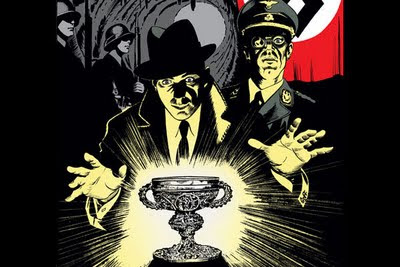Rejected by his mother and bereaved by the death of his older brother Rudolph, Otto grew into a solitary, introverted boy who assimilated the bare bones of German Romanticism through his avid childhood reading, which included Greek, Roman and Nordic mythology. It must have been hard for him to fit in at school, as his father, Karl, was a magistrate who was often transferred from town to town, making it difficult for Otto to form lasting friendships. His niece, the psychiatrist Ingheborg Rhoemer-Rahn, told me that Otto had inherited ‘second sight’ from his father who, after going blind in later life, grew increasingly convinced that he could “see heaven” or “talk to angels”.More about the Cathars, HERE
Otto’s generalised affinity with Romanticism became an all-consuming passion for the stories of Parsifal, Lohengrin, the Nibelungenlied and the tales of Jacob and Benjamin Grimm, fellow denizens of the Black Forest, whom he saw as role models in his chosen career as philologist and folklorist. While attending the University of Giessen he was encouraged by his professor, Freiherr Von Gall, to focus his studies on the history of the Cathars, the events of the Albigensian crusade and the massacre that occurred at Montségur in 1244, effectively putting an end to the Gnostic tradition in southern Europe. Rahn is quoted as saying that “My ancestors are witches and I am a heretic… It was a subject that completely captivated me”.
Otto was further inspired by the work of archæologist Heinrich Schliemann, whose theory that Homer’s Iliad reflected actual historical events led to his sensational ‘discovery’ of the ruins of Troy. Otto dreamed of achieving similar results by proving that there was a factual basis to Wolfram von Eschenbach’s epic narrative poem Parzival, a 13th-century re-creation of the story of the Holy Grail that had been left unfinished by Chrétien de Troyes. Interest in this chivalric romance had been revived in the 19th century by Wagner’s operas, and Otto set out to write a dissertation on Master Kiot, the Languedocian troubadour whose long-lost Grail ballads were said to have inspired Wolfram’s masterpiece.
Otto believed that the Cathars had been in possession of a sacred relic, described variously as a cup, a bowl, a plate, a book, or a hard, dark stone possessed of an extraordinary magical virtue. According to Wolfram’s text, whoever possessed the Grail or came into contact with the relic “would have eternal life and would be healed”. Otto was convinced that the secret of the Grail had been lost when the last of the Cathar parfaits had died on the orders of the Pope and the King of France. He sought to establish a direct link between Montsalvache, the Grail castle of Parzival, and the Cathar fortress of Montségur, scene of one of the Albigensian crusade’s most protracted sieges.
He observed that the culture of the medieval Cathars bore a strong resemblance to that of the ancient Druids, and believed that their secret wisdom might have been preserved by the troubadours, or minnesingers – the traveling poets and minstrels of medieval Europe. According to Otto, the war of the Roman Catholic Church against the Albigensians was simply a material manifestation of the ongoing apocalyptic struggle between the forces of Light and Darkness upon whose violent interaction everything in our illusory material Universe was predicated. Infinite goodness, the Cathar parfaits reasoned, was incapable of creating evil, hence the darkness, pain and misery in our world was not the will of God, but the work of the Devil, the demiurge who had hijacked creation and whom they referred to as ‘Rex Mundi’, the ruler of the transient, material world. They identified all clerical and secular rulers – principally the Catholic Church – as the personification of this Darkness and believed that it was possible through a form of direct initiation known as the consolamentum, or multiple incarnations, to eventually escape from the cycle of time and the deterministic prison of the material world, to literally return to the stars and the domain of the true, good God. (Read entire article.)
I Love Lent
4 days ago


















3 comments:
Oh my. That is quite creepy--yet fascinating.
I wonder at the visions of heaven and angels that the elder saw...sounds rather demonic to me. The article was fascinating.
Thanks, everyone, I agree!
Post a Comment